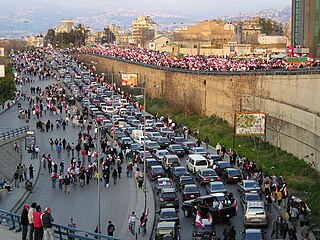
Rafic Bahaa El Deen al-Hariri was a Lebanese businessman and politician who served as prime minister of Lebanon from 1992 to 1998 and again from 2000 to 2004.

The Cedar Revolution, also known as the Independence uprising, was a chain of demonstrations in Lebanon triggered by the assassination of former Lebanese Prime Minister Rafic Hariri. The popular movement was remarkable for its avoidance of violence, peaceful approach, and its total reliance on methods of civil resistance.
The Mehlis Report is the result of the United Nations investigation into the 14 February 2005 assassination of Lebanon's former prime minister Rafik al-Hariri. The investigation was launched in accordance with UN Security Council Resolution 1595 and headed by the German prosecutor, Detlev Mehlis. It involved questioning Lebanese and Syrian officials.

The Special Tribunal for Lebanon (STL), also referred to as the Lebanon Tribunal or the Hariri Tribunal, is a tribunal of international character applying Lebanese criminal law under the authority of the United Nations to carry out the investigation and prosecution of those responsible for 14 February 2005 assassination of Rafic Hariri, the former Lebanese prime minister, and the deaths of 21 others, as well as those responsible for connected attacks.

United Nations Security Council Resolution 1636, adopted unanimously on 31 October 2005, after recalling resolutions 1373 (2001), 1566 (2004) and 1595 (2005), the council insisted that the Syrian authorities fully co-operate with the inquiry of the United Nations International Independent Investigation Commission (UNIIIC) into the assassination of former Lebanese Prime Minister Rafic Hariri, not least by arresting the suspects identified by the commission in its final report.
The United Nations International Independent Investigation Commission (UNIIIC) was established on 7 April 2005 by Security Council Resolution 1595 to investigate the assassination of former Prime Minister of Lebanon, Rafic Hariri, who had been killed in Beirut on 14 February 2005.

On 14 February 2005, former Prime Minister of Lebanon Rafic Hariri was assassinated along with 21 others in an explosion in Beirut, Lebanon. Explosives equivalent to around 1,000 kilograms of TNT were detonated as his motorcade drove near the St. George Hotel. Among the dead were several of Hariri's bodyguards and former Minister of Economy and Trade, Bassel Fleihan.

United Nations Security Council resolution 1595, adopted unanimously on 7 April 2005, after recalling its support for the sovereignty, territorial integrity and independence of Lebanon, the council established a commission to assist Lebanese authorities in their investigation of the assassination of former Prime Minister Rafic Hariri in Beirut on 14 February 2005.

United Nations Security Council Resolution 1644, adopted unanimously on 15 December 2005, after recalling resolutions 1373 (2005), 1566 (2004), 1595 (2005) and 1636 (2005), the Council demanded that Syria respond to the inquiry of the United Nations International Independent Investigation Commission (UNIIIC) into the assassination of former Lebanese Prime Minister Rafic Hariri, and extended the investigation until 15 June 2006.

United Nations Security Council Resolution 1664 was adopted unanimously on March 29, 2006; after recalling resolutions 1595 (2005), 1636 (2005) and 1644 (2005), the Council requested the Secretary-General Kofi Annan to consult with the Lebanese government concerning the establishment of an international tribunal to try those responsible for the assassination of Prime Minister Rafic Hariri and 22 others in February 2005.

United Nations Security Council Resolution 1686, adopted unanimously on June 15, 2006, after recalling previous resolutions concerning Lebanon and the region, including 1373 (2001), 1566 (2004), 1595 (2005), 1636 (2005), 1644 (2005) and 1664 (2006), the Council extended the mandate of the United Nations International Independent Investigation Commission (UNIIIC) investigating the assassination of former Lebanese Prime Minister Rafik Hariri for one year.

United Nations Security Council Resolution 2004 was unanimously adopted on 30 August 2011.

United Nations Security Council Resolution 1748 was unanimously adopted on 27 March 2007.

United Nations Security Council Resolution 1757 was adopted on 30 May 2007.

United Nations Security Council Resolution 1773 was unanimously adopted on 24 August 2007.

United Nations Security Council Resolution 1786 was unanimously adopted on 28 November 2007.

United Nations Security Council Resolution 1832 was unanimously adopted on 27 August 2008.

United Nations Security Council Resolution 1852 was unanimously adopted on 17 December 2008.
Ali Al Hajj is a former major general and ex-director general of the Lebanese Internal Security Forces.
The following lists events that happened in 2007 in Lebanon.














